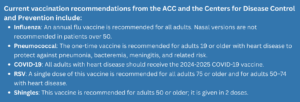Kaiser Permanente cardiologist and research scientist contributes to expert clinical guidelines on flu, COVID-19, and RSV vaccination
New guidelines from the American College of Cardiology (ACC) recommend that adults with heart disease be vaccinated against influenza, COVID-19, respiratory syncytial virus (RSV), and other respiratory illnesses that can cause cardiovascular complications. The new Concise Clinical Guidance (CCG) was published August 26 in the Journal of the American College of Cardiology (JACC).

“For people with heart disease, routine vaccination against the flu and other respiratory illnesses can mean the difference between a mild illness and a severe infection that requires hospitalization,” said co-author Ankeet Bhatt, MD, MBA, ScM, a research scientist at the Kaiser Permanente Division of Research and a cardiologist with The Permanente Medical Group. “Our goal was to make it easy for clinicians to have the information they need to talk to their patients about the benefits of vaccination and address any questions they may have.”
People with heart disease are more likely to become ill when exposed to a respiratory virus; they also have a higher risk of hospitalization or death. Studies have shown that vaccination reduces these risks. Vaccination against flu, COVID-19 and RSV may also reduce the risk of heart attacks and heart failure. However, many people are not sure about what vaccines they should receive or how often they should receive them, or do not follow up on vaccination reminders.
The ACC clinical guidance mainly focuses on respiratory vaccines but also offers guidance based on emerging evidence that other vaccines — such as the herpes zoster (shingles) vaccine — may offer cardiovascular protective benefits.
“When patients see their cardiologists, they understandably want to talk about their heart health,” said Bhatt. “With this guidance we hope to bring vaccination into these discussions. We also hope to do more to enhance the conversations patients have with their primary care providers.”
Co-authors of the Concise Clinical Guidance include Paul Heidenreich, MD, of Stanford University; Orly Vardeny, PharmD, of the University of Minnesota and the Minnesota VA; William Schaffner, MD, of Vanderbilt University; and Noreen T. Nazir, MD, of Loyola Medicine, for the ACC Solution Set Oversight Committee.
###
About the Kaiser Permanente Division of Research
The Kaiser Permanente Division of Research conducts, publishes, and disseminates epidemiologic and health services research to improve the health and medical care of Kaiser Permanente members and society at large. KPDOR seeks to understand the determinants of illness and well-being and to improve the quality and cost-effectiveness of health care. Currently, DOR’s 720-plus staff, including 73 research and staff scientists, are working on nearly 630 epidemiological and health services research projects. For more information, visit divisionofresearch.kp.org or follow us @KPDOR.






Comments (0)